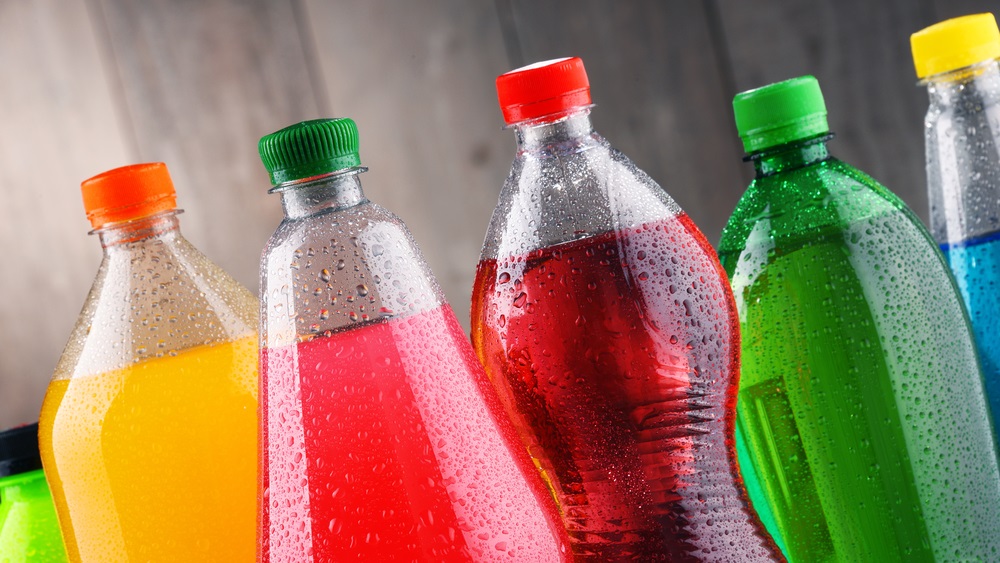- Home
- Blog
- In the News
- Vitamin waters - health drink or sugar hit?
Vitamin waters - health drink or sugar hit?
Written by Catherine Saxelby
on Friday, 28 November 2008.
Tagged: additives, caffeine, carbohydrates, children, concentration, drinks, energy, fluids, food labels, food trends, hydration, junk food, portion size, soft drinks, sugar, sugary drinks, super foods, sweetener, technology, water

Vitamin waters make claims on their pack for energy, defence, focus or recharge. Are these true or are they just sugar-laden flavoured drinks masquerading as healthy drinks? Read and download my review of the four best-sellers in this category and see why I think they're in the category of 'lolly water' ....
The hype
Their labels promise so much - "focus", "energy", "recharge" - along with a long list of vitamins that just must be doing us good! With names like "Vitamin Water" and "Nutrient Water", the average shopper would think they're getting something healthy that will pick them up and give them more vitality. In reality, these flavoured drinks are nothing more than "artificial concoctions" of sugar and additives, in my opinion.
To prove my point, just read the list of ingredients in a typical bottle (if you can - it's in a pretty small font size). There's water, then fructose (which is fruit sugar), sucrose (ordinary cane sugar), followed by three food acids (citric acid, mono-potassium phosphate, di-potassium phosphate), flavour, vitamins (C, Niacin, Pantothenic acid, B6, B12), colour (fruit and vegetable juice), magnesium lactate, calcium lactate. Despite their fancy names, the technical description says it all:
or
"Vitamin-enriched flavoured water"
Sugar content
Vitamin waters have 5 to 7% sugar (all added) which is half of what you get in soft drinks (11 to 12%). So they're lower in sugar concentration but this reduction is negated by the sheer volume of the bottle. You get 500ml rather than the 370ml in a standard can. While this is less than those huge 600ml Buddies that pass as a ‘single serve' of soft drink these days, you still end up consuming around 6 teaspoons of sugar.
| Comparison of drinks & their sugar content: | |||
|---|---|---|---|
| 500ml bottle vitamin water | 5% sugar | 25g sugar | 6 teaspoons sugar |
| 375ml can soft drink | 11% sugar | 41g sugar | 10 teaspoons sugar |
| 600ml Buddy | 11% sugar | 66g sugar | 16½ teaspoons sugar |
Given that the average woman should consume only around 45g sugar (11 teaspoons) daily, which is 10 per cent of daily kilojoules, one 500ml bottle vitamin water lands her with over half her day's intake.
How the sugar concentration compares
Vitamin waters have half the sugar found in soft drinks and juices and are on a par with sports drinks. You'll find the percentage sugar on the label under the Per 100ml column of the Nutrition Information Panel.
| Percentage of sugars in drinks: | |
|---|---|
| Soft drink | 10-11% |
| Orange juice | 8-11% |
| Pineapple juice | 12-14% |
| Flavoured milk | 8% |
| Energy drink | 11% |
| Sports drink | 5-6% |
| Vitamin water | 5-7% |
| Sports water | 2.5% |
Caffeine added
Two of the waters have added guarana - a source of caffeine derived from a vine native to South America. Nutrient Water contains 84 mg caffeine which is the same level as in energy drinks or one cup of instant coffee. The label says it's ‘natural caffeine' but it's not clear what this means (caffeine in coffee could be called ‘natural' too as it comes from beans). There's taurine added as well - ingredients that you'd find in caffeinated energy drinks like Red Bull and V. Nothing natural in that.
Flavours and colours
These drinks come in soft pastel attractive colours which would appeal to women, just as the alcopops Breezer and Cruiser do. You'll see berry colours, soft greens, warm yellows and pretty pinks.
Vitamin Water Revive says its colour is "fruit and vegetable juice" which is hard to fathom. If that's correct, then why isn't the juice listed as an ingredient rather than down the end of the list in the tiny quantities of an additive?
Nutrient Water Energy contains carotene as its colour which is the yellow-orange colour of carrots and pumpkin. It has a good safety record - no problems with that one.
Smart Water's Jump Start Tahitian Lime has two colours - 102 is tartrazine and 133 is Brilliant Blue FCF. Both these artificial colours have had question marks hanging over them for some years now and are excluded from elimination diets that check for food sensitivity. Since the publication of the UK Southhampton study, there have been calls to have them banned from foods aimed at children.
Added vitamins
All have the same B vitamins added - niacin (B3), pantothenic acid (B5), B6 and B12. It's unclear why they don't have vitamins thiamin (B1) and riboflavin or (B2). Two have vitamin C added; one also has vitamin E.
These drinks can hardly be called natural. They're are about as far from natural as any mass-produced manufactured food can be. They are simply "artificial concoctions" - the product of a factory, neither grown nor reared outdoors. What I object to most of all is the implied benefits from the words on the label "revive", "smart water", "energy", "enjoy vitamins", "recharge your batteries", "defense" and "vitamins and antioxidants" and the listing of vitamins, guarana, taurine, cranberries or pomegranate. All designed to give the buyer the impression that here is something good and healthy that will give tired over-worked consumers a pick-me-up. The most offensive is "We took it from nature". Don't know about you but I've never seen a bottle of flavoured drink growing on a tree any time I've been bushwalking!

They're marketed as a health-giving alternative to sugary soft drinks but they're nowhere near as healthy as the label would have you believe. Together these all give the impression that there's something extra in these drinks over and above ordinary drinks - which there isn't.
I like the fact that they're lower in sugar but why call them "waters" when they have 5-7% sugar, the same as a sports drink like Powerade. "Water" implies that there's nothing else except water plus a few vitamins thrown in - which is far from the truth.
The bottom line
Regard them as a cross between a sports drink and an energy drink. They've got the sugar level of a sports drink but the vitamins and caffeine of an energy drink!
Read it in the news
You can read a Sydney Morning Herald/The Age newspaper report about vitamin waters with quotes from Catherine.
Download my review
Download my FREE review (PDF 200kB) of the four best-sellers in this category.
The Good Stuff
The Boring Stuff
© 2023 Foodwatch Australia. All rights reserved
Author photo by Kate Williams
Website by Joomstore eCommerce







